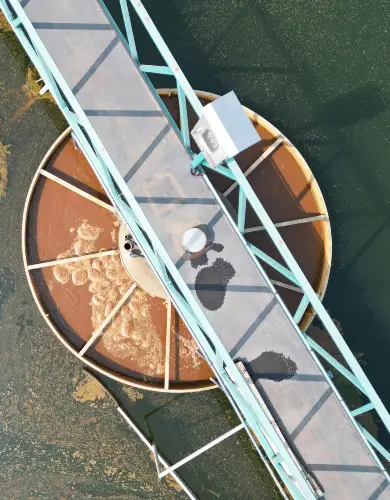AI Adoption in the British Water Industry
Artificial intelligence can transform the utilities sector through automation, predictive analytics, and more intelligent decision-making. In 2024, we are only beginning to realise its transformative potential.
AI systems excel in specialised environments with vast amounts of real-time data that can be used to train models through machine learning. The proliferation of smart sensors across the water network creates a data-rich environment where AI systems can outperform human decision-making.
In this article, we explain three current ways in which British water companies are already using AI technology:
Smart water infrastructure
The water industry regulator, Ofwat, is encouraging the adoption of AI in the British water sector to address the long-term challenge of water scarcity through its £200 million water innovation fund.
Anglian Water, a regional water company operating in an area of high water scarcity, has been awarded £7.5 million to develop Britain’s first smart water grid.
Anglian Water has named its project Safe Smart Systems. The project aims to develop an automated and connected water system in Ely, Cambridgeshire.
The smart water system is underpinned by the rollout of a range of IoT sensors that continuously monitor the water network in real time, including:
- Smart water meters in homes and businesses
- Flow rate sensors
- Pressure sensors
- Valve position sensors
- Acoustic leak detection sensors
- Level sensors in reservoirs and tanks
- Water abstraction flow rate sensors
The project will then develop and deploy an AI decision engine, using the rich data from the smart grid to take a system-level approach to decision-making.
The project aims to develop a transferable AI decision engine, providing solutions and learnings that can be applied to different local water networks across the country.
Satellite radar leak detection
Local water companies are in a constant battle to detect and fix new leaks that appear on their water and wastewater networks.
The British water industry operates over 400,000 miles of pipes, and approximately 20% of all water that flows through them is lost to leakage.
Water companies are now using satellite imagery and machine learning algorithms to detect new leaks in the network.
Services like Recover, offered by Asterra, provide live, continuous leak detection services. Satellite imagery offers live measurements of the moisture content in soil across entire water networks.
An AI model has been trained to recognise the typical data signal of a water leak and uses pattern recognition and machine learning to detect new instances of leaks.
The anomalies detected by the algorithm trigger automatic alerts for the ground teams of local water companies.
Satellite-based leak detection is already identifying more leaks at a faster rate, enabling water companies to reduce leakage across their networks.
Sewage treatment optimisation
The British water infrastructure includes 9,000 sewage works that treat wastewater, removing contaminants so it can be safely returned to rivers.
Sewage works in Britain rely on a complex biological process where sewage is carefully aerated to allow bacteria to break down organic pollutants.
The aeration tanks in sewage works already use a wide range of sensors to monitor and control the treatment process, providing live measurements of dissolved oxygen, pH, oxidation-reduction potential, temperature, and other chemical parameters. AI models can continuously process real-time data from these sensors, enabling fine adjustments to the aeration tanks to maintain optimal conditions for sewage treatment.
Water companies are under significant pressure to increase sewage works’ capacity to avoid dumping sewage into rivers. The optimisation of current facilities with AI offers a cost-effective way to increase the capacity of existing sewage works.
The AI models for wastewater treatment are being developed by internationally funded projects like DARROW, which aim to build flexible AI systems that can be deployed at sewage treatment plants globally.

